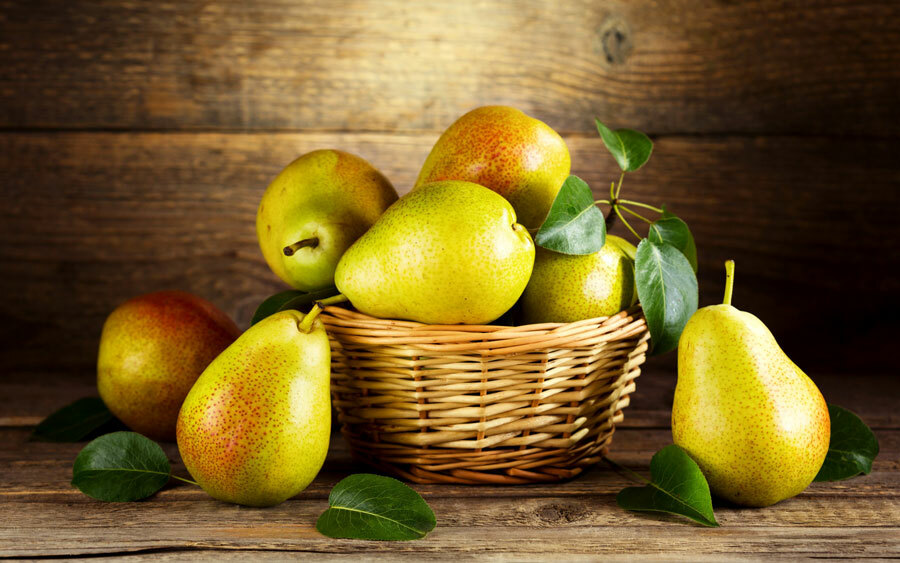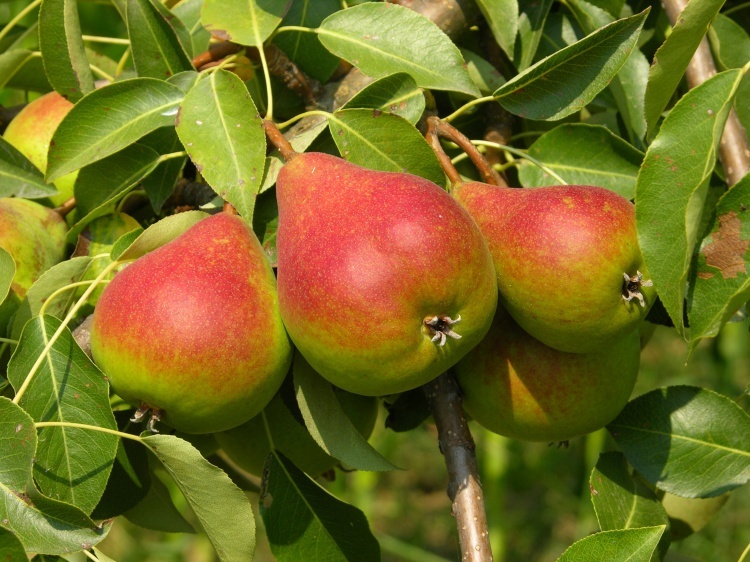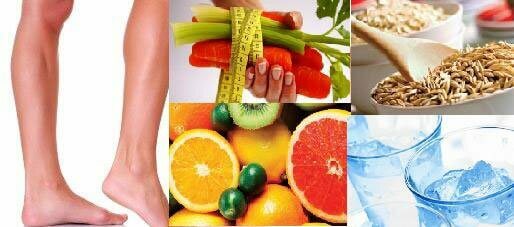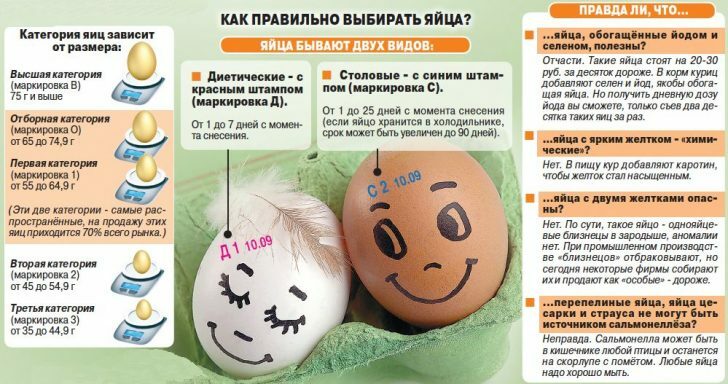Pear: benefit and harm

Pear, or as it is often called the "fruit queen", has not only an impeccable taste, but it also brings great benefits to our body.
Interesting! Originally all kinds of pears were wild shrubs.In the 16th century it was forbidden to eat pear in raw form.At first it was cooked for a couple or cooked and only after that they ate.
A little later, in France began to grow edible varieties of pears and did not need to be subjected to their thermal treatment.So there was a large number of different varieties of pears, differing in taste, color and structure.
Nowadays pears are grown in almost every country.China is considered to be its largest producer.The US Department of Agriculture determined that the world production of pears in 2005 amounted to more than 15 million tons.
chemical composition pears
Nutritional value of 100 g:
- Caloric content: 47 kcal Protein
- : 0.4 c
- Fat: 0.3 g
- Carbohydrate: 10.3 g
Show alllist »
- Dietary fiber: 2.8 g
- Organic acids: 0.5 g
- Water: 85 c
- Mono- and disaccharides: 9.8 c
- Starch: 0.5 c
- Ash: 0,7 gr
Microelements:
- Calcium: 19 mg
- Magnesium: 12 mg
- Sodium: 14 mg
- Potassium: 1
- 55 mg Phosphorus 16 mg
- Chloro 1 mg
- Sera: 6 mg
Vitamins:
- Vitamin PP: 0,1
- mg Beta-carotene 0.01 mg Vitamin
- A( RE) 2
- mcg Vitamin B1( thiamine): 0.02 mg
- Vitamin B2( riboflavin) 0.03 mg
- Vitamin B5( pantothenic): 0.05 mg
- Vitamin B6( pyridoxine): 0.03 mg
- Vitamin B9( folic): 2 μg
- Vitamin C: 5 mg
- Vitamin E( TE): 0.4 mg
- Vitamin H( biotin): 0.1 μg
- Vitamin K(Phylloquinone): 4.5 μg
- Vitamin PP( Niacinvy equivalent): 0.2 mg
Microelements:
- Iron 2.3 mg Zinc
- : 0.19 mg
- Iodine 1 ug
- Copper 120 mcg
- Manganese: 0.065 mg
- Selenium 0.1 mcg
- Fluoro 10 mcg Molybdenum
- 5 ug
- Boron: 130 ug
- Vanadium: 5. mu.g
- Silicon: 6 mg
- Cobalt 10 ug
- Nickel: 17 mcg
- Rubidium: 44 μg
The pear consist of:
- Vitamins, including folic acid.
- Microelements: calcium, iodine, potassium, copper, iron, manganese, calcium, cobalt.Tannins, nitrogenous, pectin substances.
- .
- Fiber.
- Flavonoids.
- Phytoncides.
Use of pears
Thanks to the potassium that is included in the composition, the pear plays a big role in the normalization of the heart rate, anemia and the heart as a whole.Alkaline properties of pears favorably affect the activity of the heart system.
You need to eat pears for people who have diseases of the gastrointestinal tract.They are useful in the disorder of the intestines( diarrhea), since they have fixing properties, astringent effect.To get rid of heartburn, stomach pain, adjust digestion of food and remove discomfort in the intestines, doctors recommend eating two pears each morning.
Interesting! The fruits of the pear tree are dried, they make juice, medicinal broths and infusions with other medicinal herbs and plants.
For example, a decoction from a pear is useful for the circulatory system, strengthens the walls of blood vessels, and also has antibacterial action.Pear juice is used in the treatment of gastrointestinal diseases, fills the body with vitamins, tones and strengthens it.
Decoction of dried pear is an antiseptic, anesthetic and diuretic.This effect of the fruit is due to essential oils, which they contain.That is why with inflammation of different severity of the genitourinary system and urolithiasis, two "wild" diets should be eaten on an empty stomach daily.And to solve various problems with the kidneys, cystitis treatment is used infusion only from the pear-wild.
Baked pears are useful in chronic bronchitis, sore throat, pneumonia, tuberculosis, pneumonia, and also relieve coughing and spasms in case of suffocation.Capable of lowering elevated body temperature.
Interesting! To saturate the body with vitamins and treat various diseases use not only fruits, but also leaves, pear tree seeds.
Leaves contain an anti-inflammatory and antifungal agent.Therefore, infusion of pear leaves helps with fungal diseases and extensive dermatitis.Shredded dry leaves( powder) are used to eliminate excessive sweating.Tincture based on pear seeds is an excellent anthelmintic.
Pear is a low-calorie product, therefore it is often used in the fight against excess weight, in the treatment of obesity.Refreshes, invigorates and improves mood.The pear pulp is widely used in cosmetology for the preparation of various face and body masks.Also useful for men - heals prostatitis, supports men's strength.
Important! For children and pregnant women, a pear is simply necessary, since it contains a large amount of folic acid.
Harm to pears
Pears can not be consumed by people with diseases of the nervous system, paralysis.Elderly people are not recommended to eat pears on an empty stomach.Experts advise to use them with caution, but it is better to bake or cook for a couple.This is due to the strengthening action and its difficult assimilation by the body.
During exacerbation of gastrointestinal diseases, the stomach ulcer is strictly forbidden to eat the pear in its raw form, because because of its high content, cellulose is able to irritate the mucosa and intensify peristalsis.
Important! You can not drink a pear of milk, kefir, raw cold water or seize with heavy food( meat).Otherwise, you are expected not only vomiting, nausea and diarrhea, but also serious problems with the stomach.
Recommendations
- There are pears preferably with skin, because it contains fiber and phytonutrients.
- The cost of pears depends on the place of cultivation, taste( sour or sweet), structure( granular or homogeneous) and season.Many people make pear jam.

It will not only preserve all the vitamins, useful properties, but also will give pleasure to pears in the winter.From it prepare salads, meat dishes, sauces, use for baking.



